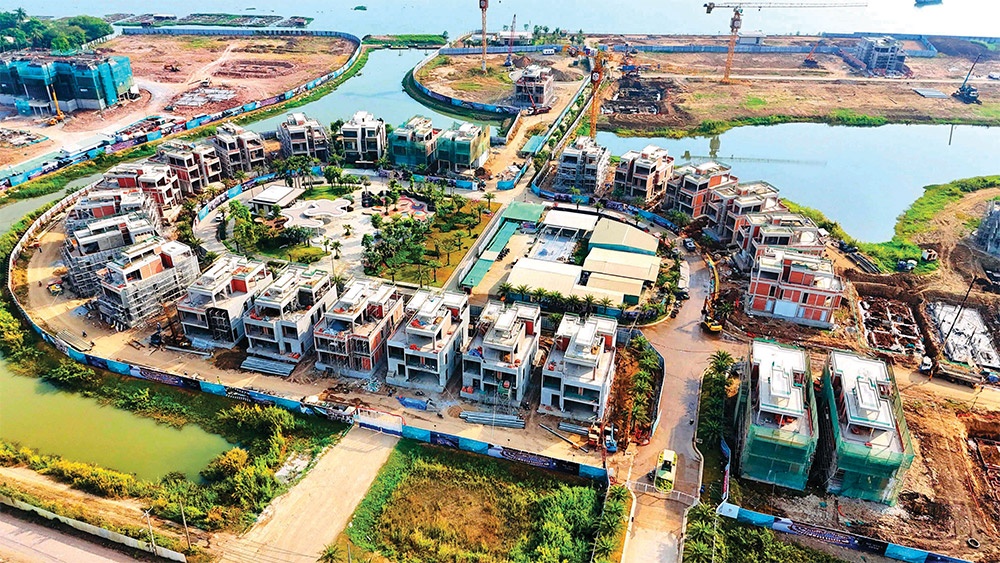Major advances offered in new real estate business rules
In a significant departure from the previous legislation, the 2023 Real Estate Business Law in Vietnam has revised the treatment of foreign-invested enterprises (FIEs) in the property sector.
 |
| Vlad Savin, partner at Acclime Vietnam |
Previously, all FIEs, irrespective of whether a foreign investor held a 0.1 per cent stake or a 100 per cent stake, were subject to the same restrictions on real estate trading activities.
The new law, however, adopts a more nuanced approach, categorising FIEs based on the percentage of ownership and layers of ownership.
The legislation distinguishes FIEs based on their adherence to conditions and procedures stipulated by law. This differentiation results in two distinct scenarios: the operational scope of the FIE is confined to a specific set of activities, and there are virtually no restrictions, and it is permitted to engage in a wide range of activities, akin to their domestic counterparts.
The activities reflect investments in construction of residential buildings or constructions associated with land use rights; technical infrastructure construction in real estate projects to transfer, lease, or sublease land use rights with technical infrastructure; leasing residential buildings, constructions, built-up floor area in constructions for subleasing; and transfer of all or part of real estate projects to continue construction.
This approach provides a more tailored regulatory environment, aligning with the specific circumstances and contributions of each FIE.
The legislation stipulates that “economic organisations with foreign investment capital” that are not subject to the specified conditions are treated on par with local companies in terms of real estate trading. The scope of permissible real estate trading activities for these FIEs has been expanded.
Included are investment in the construction of residential buildings or structures for sale, lease, or lease-purchase; funding in the construction of technical infrastructure in real estate projects to transfer, lease, or sublease land use rights along with the technical infrastructure; and purchase or lease-purchase of residential buildings, structures, or built-up floor area in structures for sale, lease, or lease-purchase.
Others are the receipt of the transfer of land use rights along with technical infrastructure in real estate projects for transfer or lease, leasing of residential buildings, structures, or built-up floor area in structures for subleasing, leasing of land use rights along with technical infrastructure in real estate projects for subleasing, and receive transfer of all or part of real estate projects to continue investment construction, business.
This comprehensive list of activities provides FIEs with broad operational scope similar to local counterparts, thereby fostering a more equitable business environment.
Stipulations and criteria
Determining whether a company is required to comply with the conditions and procedures applicable to foreign investors is a critical aspect that should be guided by the Law on Investment.
As per the law, economic organisations must meet the conditions and carry out procedures for foreign investors if they fall under one of the following categories: foreign investors hold more than half of the charter capital, or both they and economic organisations collectively hold more than half.
Conversely, an FIE can be assessed as not falling under the above categories in specific instances, such as companies where foreign investors own half or less of the charter capital. This nuanced approach allows for a more accurate evaluation of a company’s status and obligations under the investment law.
The stipulations significantly influence the strategic approach to the market, the initiation and execution of real estate projects, and the evaluation, acquisition, and disposal of real estate projects in Vietnam by foreign investors.
Consequently, it is imperative for them to formulate detailed business strategies. These strategies should encompass an appropriate plan for the division of ownership, the establishment of subsidiaries, methodologies, and the distribution of capital and profits derived from the project.
Such a comprehensive approach will optimise the business scope and ensure a more efficient and effective operation in the Vietnamese real estate market.
In addition to delineating the operational scope for FIEs in real estate projects, the new legislation also redefines the prerequisites for companies involved in real estate trading. This is achieved by introducing new, more intricate quantitative conditions. This development signifies a more comprehensive and nuanced approach to regulating the real estate sector.
The new legislation imposes a series of additional prerequisites.
Companies must not be prohibited from conducting real estate trading, nor should it be suspended or have their operations ceased as per court judgments, decisions of courts, or decisions of competent state agencies.
Companies must ensure the ratio of credit debt and corporate bond debt over ownership capital, the specifics of which will be detailed by the government.
Not only limited to cases selected as project developers, any real estate trading company involved in real estate projects must maintain ownership capital of no less than 20 per cent of the total funding for projects with land use under 20 hectares, and no less than 15 per cent of the total for projects with land use exceeding 20ha.
Companies must also ensure the ability to mobilise capital to execute the project.
These new conditions heighten the requirements for a real estate trading company, be it an FIE or a local entity, by imposing regulations on legal status, credit/bond debt, and addressing previous ambiguities in determining ownership capital to meet financial requirements with multiple projects from the same investor.
However, these conditions could pose a risk to businesses if any condition is not met during project implementation, such as being suspended by a court decision or an imbalance in debt management leading to increased ratios.
Such scenarios could have a profound impact not only on the company or project but could also potentially lead to disputes with operational projects, particularly with clients, contractors, and other developers in the build-operate-transfer project.
 |
| Major advances offered in new real estate business rules, illustration photo |
Deposit limits and agreements
Prior regulations on real estate trading and associated laws did not address deposits or deposit agreements in future-formed real estate transactions.
As a result, a real estate project developer could demand buyers to deposit up to 95 per cent of the sales price under the Civil Code. This could be attributed to the developer’s potential lack of financial resources to execute the real estate project, leading to a desire to mobilise capital from the buyers.
However, standard capital mobilisation agreements with other investors did not allow developers to distribute profits by real estate products.
Another contributing factor could be that the project may not have met the sales requirements stipulated by law, but the developers were keen to expedite the sales process for turnover and reinvestment into other projects.
In addition to the deposit of 95 per cent of the sales contract, to circumvent direct responsibilities with the buyers under such deposit agreements, developers allowed real estate brokers or agencies to sign such deposit agreements under authorisation contracts, cooperation contracts, or distribution contracts.
This practice posed numerous risks for the buyers regarding the deposit under previous laws, as evidenced by recent criminal cases in Vietnam.
Therefore, the new rules specify that the deposit limit must not exceed 5 per cent of the sales price in future-formed property transactions, and developers must directly enter into deposit agreements with the buyers. Both foreign-owned developers and foreign buyers should take note of this point when participating in future-formed property transactions.
The newly enacted real estate trading law in Vietnam appears to be a significant advancement for foreign investors and FIEs. It provides numerous benefits, including an expanded business environment predicated on the foreign ownership ratio and the corporate structure.
This creates a wealth of opportunities in the dynamic real estate market and ensures equitable treatment based on their level of funding. However, the introduction of numerous new regulations also presents certain challenges, as further guidance from the Vietnamese authorities is still forthcoming.
Consequently, foreign investors are advised to evaluate their business plans meticulously and strategise their corporate structures to capitalise on the market’s flexibility and potential. While the future trajectory of foreign investment in Vietnam remains uncertain, the new law represents a promising stride towards a more transparent and accessible real estate sector.
 | Sentiment robust from foreign real estate investors Business seems to be picking up favourably in Vietnam’s real estate arena. |
 | Impacts of land law on foreign investors The implementation of Vietnam’s new Land Law, effective from next year, brings significant changes that will shape the landscape for real estate investors, particularly foreign investors, who must navigate these changes strategically. |
 | Difficulties gradually on the wane in real estate sector The real estate market boasts great expectations ahead of a series of amended laws and favourable interest rate policies. |
What the stars mean:
★ Poor ★ ★ Promising ★★★ Good ★★★★ Very good ★★★★★ Exceptional
 Tag:
Tag:
Related Contents
Latest News
More News
- Construction firms poised for growth on public investment and capital market support (February 11, 2026 | 11:38)
- Mitsubishi acquires Thuan An 1 residential development from PDR (February 09, 2026 | 08:00)
- Frasers Property and GELEX Infrastructure propose new joint venture (February 07, 2026 | 15:00)
- Sun Group led consortium selected as investor for new urban area (February 06, 2026 | 15:20)
- Vietnam breaks into Top 10 countries and regions for LEED outside the US (February 05, 2026 | 17:56)
- Fairmont opens first Vietnam property in Hanoi (February 04, 2026 | 16:09)
- Real estate investment trusts pivotal for long-term success (February 02, 2026 | 11:09)
- Dong Nai experiences shifting expectations and new industrial cycle (January 28, 2026 | 09:00)
- An Phat 5 Industrial Park targets ESG-driven investors in Hai Phong (January 26, 2026 | 08:30)
- Decree opens incentives for green urban development (January 24, 2026 | 11:18)























 Mobile Version
Mobile Version